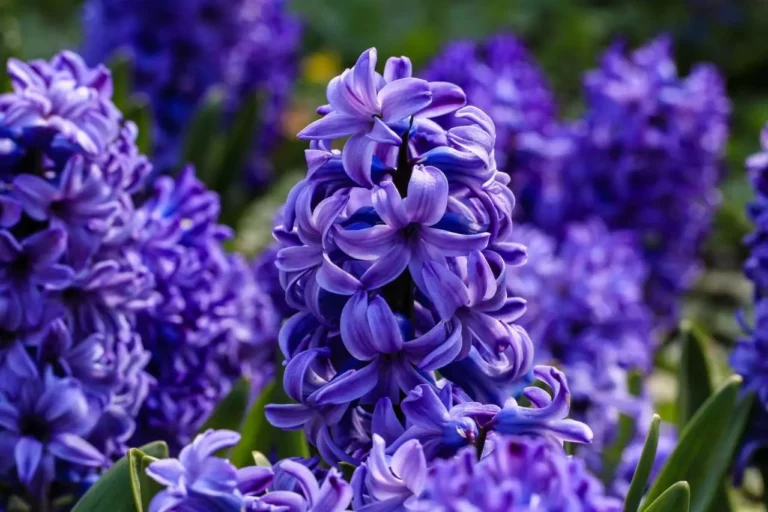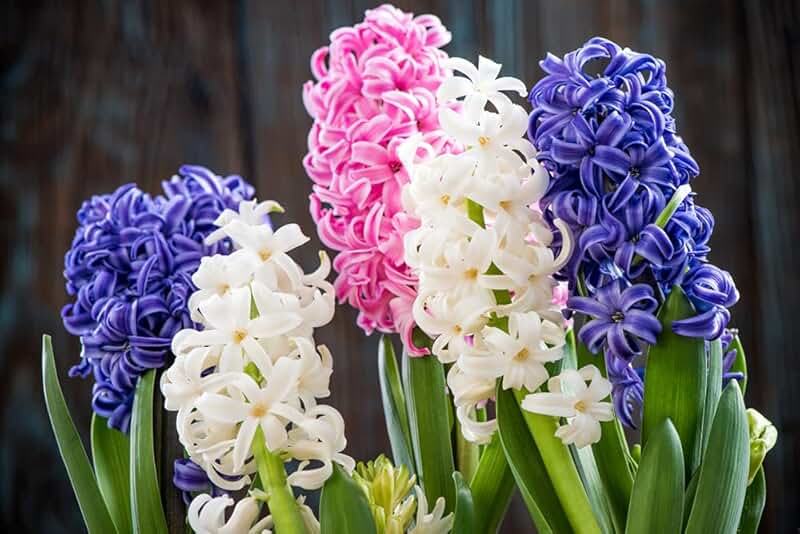Meaning
Etymology
Hyacinthus is a proper noun, primarily known as a masculine given name. Its origins lie in ancient Greek mythology and carry with them a rich history steeped in symbolism.
Etymologically, Hyacinthus derives from the Greek word “hyakinthos,” which refers to the hyacinth flower. This delicate, fragrant bloom held significant cultural importance for the ancient Greeks, often associated with beauty, love, playfulness, and remembrance.
In Greek mythology, Hyacinthus was a beloved youth, favored by the god Apollo. Tragically, during a playful discus throw, Apollo accidentally struck Hyacinthus with the discus, causing his death. Grief-stricken, Apollo transformed Hyacinthus’s blood into the vibrant hyacinth flower, thus linking the name and the blossom forever.
The association of the name Hyacinthus with both beauty and tragedy has contributed to its enduring appeal throughout history. It evokes a sense of both fragility and resilience, reminding us of the ephemeral nature of life while celebrating the enduring power of love and remembrance.
Symbolism and Associations
The word “hyacinth” evokes a sense of delicate beauty, vibrant color, and fragrant sweetness. Its meaning extends beyond its botanical definition, intertwining with mythology, symbolism, and cultural associations throughout history.
Originating from the Greek name “Hyakinthos,” the flower is directly linked to the tragic tale of Hyacinthus, a youth beloved by the god Apollo. In this myth, Zephyrus, the west wind, jealous of their close bond, accidentally struck Hyacinthus with a discus thrown by Apollo, causing his death. From his spilled blood grew the hyacinth flower, imbued with the poignant memory of his untimely demise.
The color blue, often associated with hyacinths, carries a weight of symbolism across cultures. It represents serenity, peace, wisdom, and faithfulness. In some traditions, blue also symbolizes royalty and divinity, echoing Apollo’s status as a god.
Beyond its mythological origins, the hyacinth holds symbolic significance in various contexts. It is frequently linked to mourning and remembrance, particularly for those lost young or tragically.
The hyacinth’s sweet fragrance adds another layer of meaning, often representing joy, love, and even playfulness. This duality – both sorrowful beauty and fragrant delight – creates a complex tapestry of emotions and associations woven into the flower’s symbolism.
Furthermore, the hyacinth has become a symbol of spring renewal and rebirth, symbolizing hope after periods of darkness or loss.
Ultimately, the meaning of “hyacinth” transcends its literal botanical definition. It encapsulates a rich tapestry of history, myth, emotion, and cultural understanding, making it more than just a flower but a powerful symbol imbued with multifaceted meaning.
Origin and History
Mythological Origins
Hyacinthus is a masculine given name with Greek origins. Its meaning is generally understood to be “violet” or “hyacinth flower,” referencing the beautiful purple blooms that inspired its namesake.
The name’s mythological roots are deeply intertwined with ancient Greek legend. Hyacinthus was a beloved Spartan youth known for his unparalleled beauty. In one version of the myth, Apollo, the god of light and music, fell madly in love with Hyacinthus. During a playful discus throwing session, Apollo accidentally struck Hyacinthus with the discus, killing him instantly.
Devastated by grief, Apollo transformed Hyacinthus’ blood into the hyacinth flower, imbuing it with his memory and beauty. This story explains why the flower is often associated with mourning, remembrance, and love lost.
The name Hyacinthus gained popularity in Western culture during the Renaissance period, influenced by a renewed interest in Greek mythology and classical antiquity. Its popularity has waxed and waned over the centuries but remains a relatively uncommon yet distinctive choice for baby boys today.
Historical Usage
Hyacinthus is a given name with Greek origins. It derives from the ancient Greek word “hyakinthos,” which referred to a type of flower renowned for its beauty and fragrance.
In Greek mythology, Hyacinthus was a handsome Spartan youth who was beloved by the god Apollo. During a discus-throwing game, a thrown discus tragically struck Hyacinthus, causing his death. Consumed by grief, Apollo transformed the bloodied ground where Hyacinthus fell into a flower bearing his name, the hyacinth.
The association with the mythical figure imbued the name Hyacinthus with a sense of tragedy and beauty, making it popular in ancient Greece and Rome.
Throughout history, the name has been used in various cultures, often with variations in spelling and pronunciation. In English, its usage has remained relatively consistent, although less common than other classic names.
The name’s enduring appeal likely stems from its lyrical sound and its connection to both beauty and loss. The hyacinth flower itself symbolizes constancy, sorrow, sport, playfulness, and sincerity.
Cultural Impact
Literature and Art
Hyacinthus, a name steeped in mythology and symbolism, transcends its simple etymological roots to carry profound cultural impact across literature and art.
Derived from the ancient Greek word “hyakinthos,” meaning “violet” or “purple flower,” the name is intrinsically linked to beauty, fragrance, and ephemeral pleasure. This connection finds expression in Greek mythology, where Hyacinthus was a beloved youth, pursued by the god Apollo. Tragically, during a discus-throwing contest, Apollo accidentally struck Hyacinthus, killing him. Out of grief, Apollo transformed Hyacinth’s blood into the vibrant purple hyacinth flower, thus immortalizing his memory.
The story of Hyacinthus resonated throughout Western civilization, permeating literature and art with its themes of love, loss, and the fleeting nature of beauty. Ancient Greek poets like Ovid and Sappho wove tales of Hyacinthus into their works, emphasizing the tragic consequences of passionate desires.
Later, during the Renaissance, artists such as Caravaggio and Botticelli revisited the myth, capturing the poignant moment of Hyacinthus’ death and the birth of the flower in elaborate paintings. These artworks often depicted Hyacinthus as a symbol of youthful innocence and beauty tragically cut short.
The influence of the Hyacinthus story extends beyond visual arts. Shakespeare, for instance, alludes to the myth in his plays, using it to symbolize lost love and the fragility of human existence. Even today, the name Hyacinthus continues to evoke a sense of wistful beauty and melancholic longing.
In conclusion, the cultural impact of the name Hyacinthus is profound and multifaceted. Its association with mythology, literature, and art has cemented its position as a potent symbol of love, loss, beauty, and transience, reminding us of the enduring power of stories to shape our understanding of human experience.
Modern Usage
The name Hyacinthus carries a rich cultural impact, deeply rooted in ancient Greek mythology and blossoming into various modern usages in the English language.
In classical Greek literature, Hyacinthus was a beloved youth renowned for his beauty and athletic prowess. He was the object of Apollo’s affections, but their tragic love story ended abruptly when a discus thrown by Zephyr, the west wind, struck Hyacinthus, leading to his untimely demise.
Apollo, devastated by Hyacinthus’ death, transformed the blood that stained the earth into a flower bearing his name – the hyacinth. This legend imbued the flower with symbolic significance, representing love, beauty, constancy, and ultimately, the ephemeral nature of life.
Beyond its mythological origins, the name Hyacinthus has transcended time to become a popular given name in various cultures.
It is often associated with qualities such as:
- Charm
- Gracefulness
- Sensitivity
Modern usage of the name Hyacinthus tends to lean towards a more artistic and intellectual sphere, often found in literary works, music, and poetry. Its rarity adds to its allure, evoking a sense of mystique and sophistication.
While the name Hyacinthus is not as common as other names, its enduring presence in language and culture speaks volumes about its powerful symbolism and lasting impact.
- Best LeadsGorilla Alternatives for 2025 - April 26, 2025
- Best Overloop Alternatives for 2025 - April 25, 2025
- Best Lead411 Alternatives for 2025 - April 25, 2025


